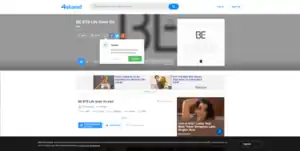4shared
4shared, also known as 4shared.com, is a file-sharing website.
Screenshot  | |
Type of site | File hosting |
|---|---|
| Available in | English, German, Russian, Korean, Indonesian, Malay, Portuguese (Brazil), Italian, French, Spanish, Chinese, Arabic, Vietnamese, Thai, Japanese, Persian, Polish, Turkish |
| Founded | 2005 |
| Headquarters | Kyiv, Ukraine |
| URL | www |
| Commercial | Yes |
| Launched | 2005 |
| Native client(s) on |
|
Features
4shared supports the WebDAV, FTP, and SFTP protocols, in addition to having a web interface. 4shared is a freemium service, with significant usage limitations on non-paying users, such as a daily bandwidth limit of 3 GB.[1]
History
In 2011, 4shared was ranked the largest file-sharing website, beating out others such as Megaupload and MediaFire.[2]
The site was labelled as a notorious market in 2016: "While 4shared provides legitimate file-storage services, the site also facilitates the streaming and downloading of high volumes of allegedly pirated videos, music, books, and video games."[3]
In 2019, 4shared's Android app was discovered to be serving invisible advertisements to users, and automatically signing them up for unwanted services. The app was replaced with a non-malicious version on April of the same year, after being removed on Google Play.[4]
See also
References
- Sharma, Mayank (June 17, 2020). "4shared file sharing review". TechRadar. Archived from the original on October 19, 2020. Retrieved December 25, 2020.
- Van der Sar, Ernesto (August 27, 2011). "Top 10 Largest File-Sharing Sites". TorrentFreak. Archived from the original on November 8, 2020. Retrieved December 25, 2020.
- "2016 Out-of-Cycle Review of Notorious Markets" (PDF). Office of the United States Trade Representative. December 23, 2016. p. 7. Archived (PDF) from the original on December 23, 2020. Retrieved December 26, 2020.
- Whittaker, Zack (July 2, 2019). "File-storage app 4shared caught serving invisible advertisements and making purchases without consent". TechCrunch. Archived from the original on July 16, 2020. Retrieved December 25, 2020.